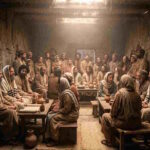5 Major Differences Between Passover and Easter – Isaac Khalil lifehopeandtruth.com
The distinction between Passover and Easter goes beyond the surface understanding that Passover is Jewish and Easter is Christian. Let’s explore five significant differences between these two observances:
Difference 1: Passover’s biblical origin vs. Easter’s absence in Scripture. Passover originates from Exodus 12, commemorating the Israelites’ deliverance from Egypt through the blood of the lamb. In contrast, Easter lacks biblical grounding, with no legitimate references in Scripture.
Difference 2: God-ordained vs. human tradition Passover was commanded by God to be observed, whereas Easter’s observance was established by the Catholic Church at the Council of Nicaea in A.D. 325, without scriptural authority.
Difference 3: Passover’s fixed day vs. Easter’s movable day Passover is fixed on the 14th day of the first Hebrew month, while Easter’s date, determined by the Council of Nicaea, falls on the first Sunday after the first full moon following the vernal equinox.
Difference 4: Passover as a memorial of Jesus’ death vs. Easter as a celebration of His resurrection Passover symbolizes Jesus as the sacrificial Lamb, with elements like unleavened bread and wine representing His body and blood. Easter, purportedly celebrating Christ’s resurrection, lacks biblical command and historical evidence.
Difference 5: Passover’s meaningful symbols vs. Easter’s pagan origins Passover symbols hold deep spiritual significance, reflecting Jesus’ sacrifice and servanthood. In contrast, Easter symbols like eggs and bunnies derive from ancient pagan customs, unrelated to Jesus’ sacrifice or resurrection.
Understanding these differences encourages a deeper examination of Passover’s biblical significance and prompts a reconsideration of Easter’s traditions.
#PassoverVsEaster #BiblicalTruth #TraditionVsScripture #EasterOrigins
Report Story




